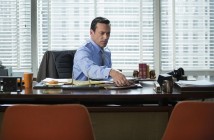It’s Always Sunny in Philedelphia, Season 6, Episode 13, “A Very Sunny Christmas”
Original airdate December 16, 2010
A bonus Christmas episode which aired between the runs of seasons 6 and 7, “A Very Sunny Christmas” provided a special holiday treat to fans of the show. First seen as a supplementary episode to the season 6 box set, this Christmas special didn’t air on FX until the following winter season. By this time, however, the episode had already become a Sunny favorite, oft cited amongst pivotal episodes in the series’ long trajectory.
A show which didn’t find its footing until the second or third season, after which it rose to critical and commercial acclaim, It’s Always Sunny In Philadelphia spent much time building each character’s now iconic persona. By the sixth season, Sunny had found its niche and its target audience; its characters had become fully formed, and every episode became an instant classic. With “A Very Sunny Christmas”, the show arguably confirmed its place amongst the best sitcoms of the 21st century. Its unique comedic mode had finally reached audiences, and its undeniable humor became hard to contend with.
At double the length of a regular episode, the Christmas special presents just about everything there is to love about the show and its well-formed characters. To the point, almost, of being caricatures, the gang’s affable chemistry and unique individual qualities are perfectly illustrated. In the very first scene, we see Charlie’s stupidity, Mac’s egoism, Denis’ vanity, Dee’s insecurity, and Frank’s debasement. As the story develops, these qualities are shored up not to a point of over-saturation but to a perfect synthesis of divergent forms of comedy.
Two storylines are established in “A Very Sunny Christmas”. In the first, Dennis and Dee square off against their asshole father whose idea of a great Christmas is to present the kids with gifts which they will never ever actually receive. In their frustration, they treat Frank to a working of A Christmas Carol, wherein Frank’s former business partner, Eugene, makes an appearance as the Christmas spirit. Dennis and Dee’s intentions are to show Frank the error of his ways, not to enliven his spirit but to destroy him in guilt. When Frank finally sees his wrongdoing, the kids are in disbelief, until a final turn of events leaves them all empty-handed.
Running parallel is a story of Charlie and Mac reminiscing on their memories of a wonderful Christmas childhood. Sharing their Christmas traditions, however, deflates their sense of holiday spirit as both discover a painful secret of their past. Disturbing their memories and Christmas livelihood, Charlie and Mac aim to rectify their present sense of Christmas by amending their past. This proves fruitless, as they discover that they are not nearly as giving as they’d like to believe. Still, the boys have each other. In the final and most sentimental scene of the episode, a two shot of adult Charlie and Mac throwing rocks at trains dissolves into a parallel two shot of them as children. Illustrating the perpetual nature of their unique brand of the Christmas non-spirit, this scene has a certain way of tugging the heart strings.
Thematically underlying this Christmas special is a search for Christmas spirit in the lives of people who frankly don’t and will never understand the pure joy of giving and togetherness which is at the heart of it. While It’s Always Sunny has always found a way to make their detestable characters perfectly affable, this phenomenal mode of comedy, of juxtaposition and contrast, has hardly been as rich as seen in the Christmas special. The deranged, rundown, morally absent peddlers of St. Paddy’s pub are perfectly antithetical to the spirit of Christmas which they so seek to discover.
As such, the episode works not only as a Christmas episode but an anti-Christmas episode. While it takes on many forms and themes of the Christmas special, even including claymation and caroling, it constantly deconstructs these forms and themes, directing them in an opposing manner to what might be expected from holiday television. Instead of reveling in the end with joy and laughter, the episode ends like most Sunny episodes, with pity, contempt, and frustration. It’s a pleasant turn from the hokum we are used to. Christmas isn’t always cheery after all, is it?




